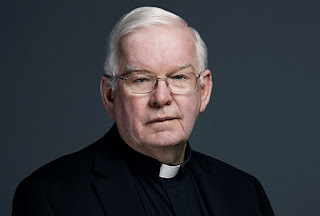In Memoriam: Fr. Thomas Buckley
Jonathan Den Hartog
I may have been reading the wrong publications, but I was shocked to find out at the start of this year that Fr. Thomas Buckley, S.J. had passed away late last year (announcements here and here). Fr. Buckley's death is a great loss to American religious history.
Fr. Buckley's greatest historical contribution came in our understanding of religious disestablishment, especially in Virginia. His work Church and State in Revolutionary Virginia became the standard work for understanding both the process and the ideas involved in Virginia's disestablishment. Fr. Buckley combed the archives, and he knew early national Virginia's religious sources better than anyone. Fr. Buckley helped historians understand that although Jefferson and Madison mattered--including Madison's "Memorial and Remonstrance"--the evangelical dissenters of Virginia also deserved much attention. Their numbers and willingness to ally with Jefferson and Madison truly allowed disestablishment to happen, over the protests of both Virginia's Anglicans and the oratory of Patrick Henry. He demonstrated there were both theological and practical reasons for wanting to disassemble Virginia's establishment that deserved attention.
Almost forty years later, Fr. Buckley returned to the topic of disestablishment in Virginia, publishing Establishing Religious Freedom. Here, he traced how legal disestablishment was only the start of a long process in Virginia that raised questions about property, county and state charity and welfare concerns, church incorporation, and the legal standing of religious bodies. Read with Church and State in Revolutionary Virginia, these two books tell us much about both church and state in Virginia and the standing of religion in the early republic.
Fr. Buckley also wrote on other topics. His The Great Catastrophe of My Life traced divorce in early national Virginia and contributed to both legal studies and cultural understandings of marriage and family life in the state. He thus deserves credit as an early Americanist generally.
Fr. Buckley served as a pioneer examining religion in the early republic, pointing to its importance when it was receiving much less attention than it has subsequently received. He enlarged our understanding of religion in early American politics. Through doing outstanding work, he reconstructed an important part of the American experience.
I had the great opportunity to meet Fr. Buckley at a small conference, and he was strongly encouraging of a young scholar. His subsequent emails were upbeat and engaged through last year--which was why his passing came as a shock.
Still, Fr. Buckley's work was significant for understanding religion and politics in early America. Students of the early republic and of disestablishment will continue to study his work. And, events such as the upcoming Religion and Politics in Early America Conference will carry on his spirit.
I may have been reading the wrong publications, but I was shocked to find out at the start of this year that Fr. Thomas Buckley, S.J. had passed away late last year (announcements here and here). Fr. Buckley's death is a great loss to American religious history.
 |
| Fr. Buckley, from the Western Province of the Jesuits. |
Almost forty years later, Fr. Buckley returned to the topic of disestablishment in Virginia, publishing Establishing Religious Freedom. Here, he traced how legal disestablishment was only the start of a long process in Virginia that raised questions about property, county and state charity and welfare concerns, church incorporation, and the legal standing of religious bodies. Read with Church and State in Revolutionary Virginia, these two books tell us much about both church and state in Virginia and the standing of religion in the early republic.
Fr. Buckley also wrote on other topics. His The Great Catastrophe of My Life traced divorce in early national Virginia and contributed to both legal studies and cultural understandings of marriage and family life in the state. He thus deserves credit as an early Americanist generally.
Fr. Buckley served as a pioneer examining religion in the early republic, pointing to its importance when it was receiving much less attention than it has subsequently received. He enlarged our understanding of religion in early American politics. Through doing outstanding work, he reconstructed an important part of the American experience.
I had the great opportunity to meet Fr. Buckley at a small conference, and he was strongly encouraging of a young scholar. His subsequent emails were upbeat and engaged through last year--which was why his passing came as a shock.
Still, Fr. Buckley's work was significant for understanding religion and politics in early America. Students of the early republic and of disestablishment will continue to study his work. And, events such as the upcoming Religion and Politics in Early America Conference will carry on his spirit.

Comments